-
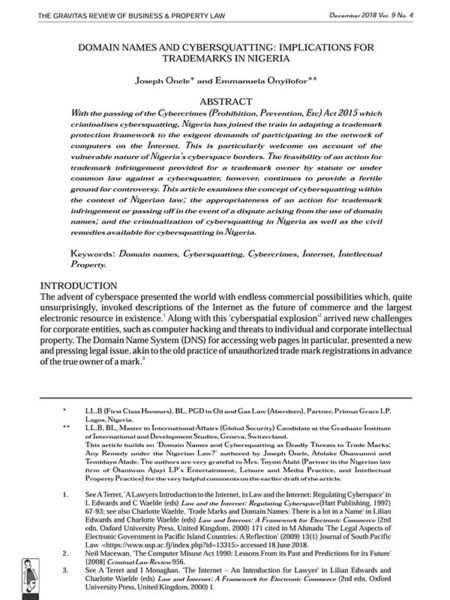
Domain Names and Cybersquatting: Implications for Trademarks in Nigeria
0₦2,500.00Joseph Onele, Partner Primus Grace LP and Emmanuela Onyilofor, Graduate Student at the Institute of International and Development Studies Geneva, in their article, Domain Names and Cybersquatting: Implications for Trademarks in Nigeria, examine the regulation of domain names and the concept of cybersquatting in Nigerian law. They consider the appropriateness of instituting an action for trademark infringement or passing off in the event of a dispute arising from the use of domain names, the criminalisation of cybersquatting as well as the civil remedies available for cybersquatting in Nigeria.
-
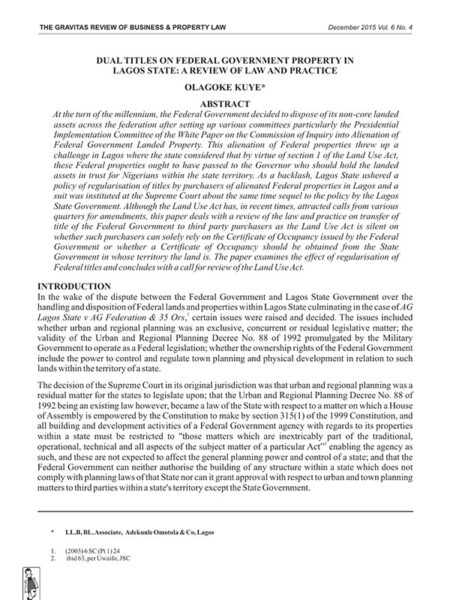
Dual Titles on Federal Government Property in Lagos State: A Review of Law and Practice
0₦2,500.00Olagoke Kuye, Associate, Adekunle Omotola & Co in “Dual Titles on Federal Government Property In Lagos State: A Review of Law and Practice” examines the controversial issue of ‘regularisation’ of Federal Government titles by the Lagos State Government and posits that the problem arose from the inadequate provisions of the Land Use Act and the land tenure history of Lagos State.
-
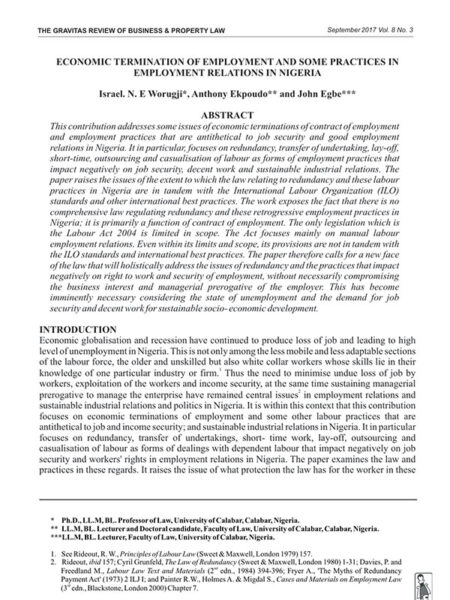
Economic Termination of Employment and some Practices in Employment Relations in Nigeria
0₦2,500.00Professor Israel Worugji, Anthony Ekpoudo and John Egbe, all of the University of Calabar in their article, “Economic Termination of Employment and Some Practices in Employment Relations in Nigeria” examine some issues of economic terminations of employment and practices that are antithetical to job security and good employment relations in Nigeria. They examine the legal framework for redundancy, transfer of undertakings, lay-off and short-time work, outsourcing and casualisation. They argue that the inadequacies of the Labour Act, and its focus on manual labour makes it short of ILO standards and international best practices. They call for a new face of the law that addresses the practices that impact negatively on the right to work and security of employment, without necessarily compromising the business interest and managerial prerogative of the employer.
-
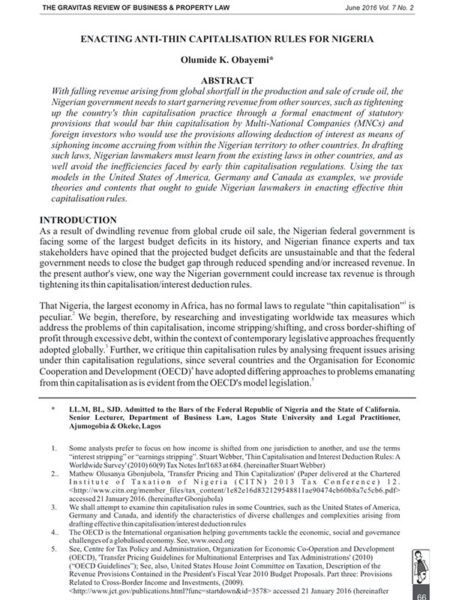
Enacting Anti-thin Capitalisation Rules for Nigeria
0₦2,500.00Dr Olumide Obayemi, Legal Practitioner, Ajumogobia & Okeke and Senior Lecturer, Department of Business Law, Lagos State University Ojo, examines an important topic that straddles corporate law, corporate finance and taxation. In his article, “Enacting Anti-Thin Capitalisation Rules for Nigeria”, he examines a financing strategy mostly favoured by multinational corporations (MNCs) in making investments outside their home nations. As debt is often a more tax efficient method of finance than equity because interest is tax deductible while dividend is not, most jurisdictions have prescribed rules to deal with the debt/equity mix by placing a ceiling on debt/equity ratio so that their tax base is not eroded as foreign firms finance their subsidiaries with excessive debt. Dr Obayemi explores anti-thin capitalisation rules in several jurisdictions and advocates the enactment of effective anti-thin capitalisation rules in Nigeria with a safe harbour of 1.5 to 1 debt-to-equity as the starting point.
-
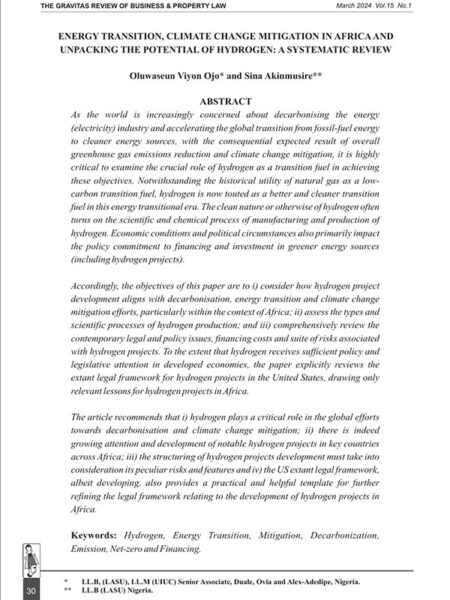
Energy Transition, Climate Change Mitigation in Africa and Unpacking the Potential of Hydrogen: A Systematic Review
0₦2,500.00Oluwaseun Viyon Ojo and Sina Akinmusire, in their article, Energy Transition, Climate Change Mitigation in Africa and Unpacking the Potential of Hydrogen: A Systematic Review, address increasing concerns about decarbonizing the energy (electricity) industry and accelerating the global transition from fossil-fuel energy to cleaner energy sources. With the consequential expected result of overall greenhouse gas emissions reduction and climate change mitigation, it is extremely critical to examine the crucial role of hydrogen as a transition fuel in achieving these objectives. Notwithstanding the historical utility of natural gas as a low-carbon transition fuel, hydrogen is now touted as a better and cleaner transition fuel in this energy transitional era. The clean nature or otherwise of hydrogen often turn on the scientific and chemical process of manufacturing and production of hydrogen. Crucially, economic conditions and political circumstances also largely impact the policy commitment to financing and investment in greener energy sources (including hydrogen projects). Ojo and Akinmusire address a number of cognate issues. They consider how hydrogen project development aligns with decarbonization, energy transition and to the extent that hydrogen is currently receiving sufficient policy and legislative attention in developed economies, the paper specifically reviews the extant legal framework for hydrogen projects in the United States, drawing only relevant lessons for hydrogen projects in Africa..
-
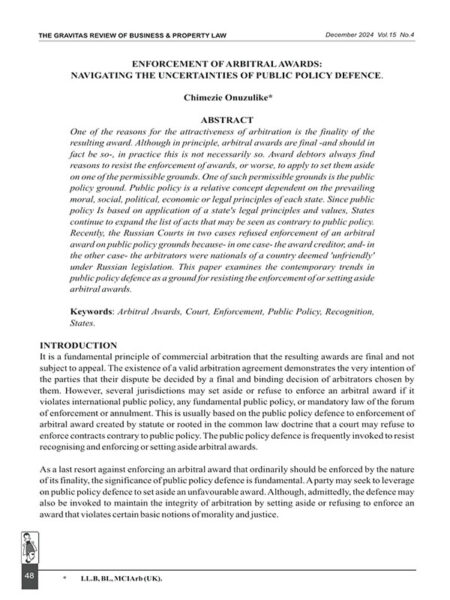
Enforcement of Arbitral Awards: Navigating the Uncertainties of Public Policy Defence
0₦2,500.00Chimezie Onuzulike in his article, Enforcement of Arbitral Awards: Navigating the Uncertainties of Public Policy Defence, examines the contemporary trends in public policy defence as a ground for resisting the enforcement of or setting aside arbitral awards. One of the reasons for the attractiveness of arbitration is the finality of the resulting award. Although in principle, arbitral awards are final -and should in fact be so-, in practice this is not necessarily so. Award debtors always find reasons to resist the enforcement of awards, or worse, to apply to set them aside on one of the permissible grounds. One of such permissible grounds is the public policy ground. Public policy is a relative concept dependent on the prevailing moral, social, political, economic or legal principles of each state. Since public policy Is based on application of a state’s legal principles and values, States continue to expand the list of acts that may be seen as contrary to public policy. Recently, the Russian Courts in two cases refused enforcement of an arbitral award on public policy grounds because- in one case- the award creditor, and- in the other case- the arbitrators were nationals of a country deemed ‘unfriendly’ under Russian legislation.
-
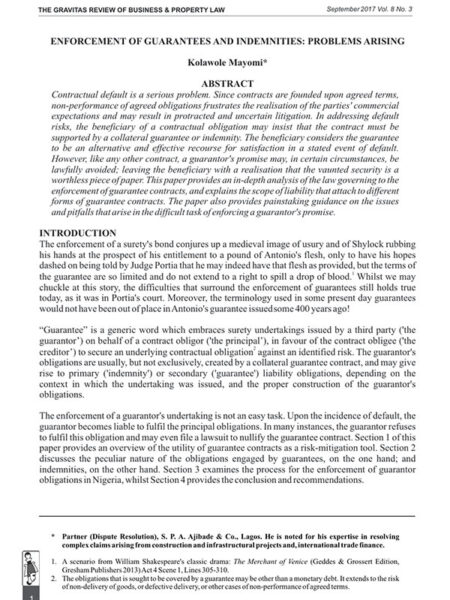
Enforcement of Guarantees and Indemnities: Problems Arising
0₦2,500.00Kolawole Mayomi, Partner S.P.A. Ajibade & Co in his article, “Enforcement of Guarantees and Indemnities: Problems Arising” provides an in-depth analysis of the law relating to guarantees and indemnities. He notes that while the law relating to guarantee and indemnity contracts in Nigeria is case driven, the courts have conflated the principles undergirding them. The consequences being opening up a guarantor to unconditional liability or imposing onerous obligation on the creditor holding an indemnity contract. He examines how risks are covered, the difference between guarantee and indemnity contracts, and grounds for resisting enforcement of each.
-
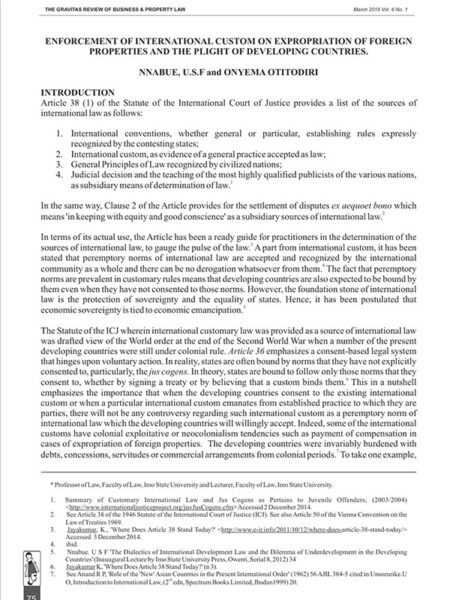
Enforcement of International Customs on Expropriation of Foreign Properties and the Plight of Developing Countries
0₦2,500.00Professor Nnabue and Mr. Otitodiri, Professor of Law, Faculty of Law, Imo State University and Lecturer, Faculty of Law, Imo State University, in their article “Enforcement of International Customs on Expropriation of Foreign Properties and the Plight of Developing Countries” examine the enforcement of International Customs on Expropriation of foreign properties and the plight of developing countries. The sources of the law are fraught with irregularities and questions still remain. Although Article 38 of the statute of ICJ has helped to define international law as a discipline distinct from politics and international relations, it has fallen short of seeing the process through. As dynamic as society is, law needs to be one step ahead to ensure that there is a means to keep actions and omissions in check.
-
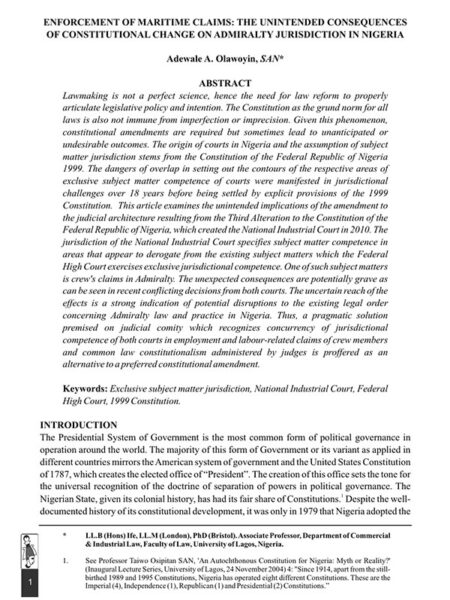
Enforcement of Maritime Claims: The Unintended Consequences of Constitutional Change on Admiralty Jurisdiction in Nigeria
0₦2,500.00Dr Adewale Olawoyin SAN, Associate Professor, Department of Commercial & Industrial Law University of Lagos Nigeria in his article, Enforcement of Maritime Claims: The Unintended Consequences of Constitutional Change on Admiralty Jurisdiction in Nigeria, examines the unintended implications of the Third Alteration to the 1999 Constitution of Nigeria. Section 251 of the 1999 Constitution vests exclusive jurisdiction in admiralty matters in the Federal High Court (FHC). Section 254C (1) of the Constitution (introduced by the Constitution of the Federal Republic of Nigeria (Third Alteration) Act 2010) vests exclusive jurisdiction in all labour and employment matters in the National Industrial Court (NIC). Meanwhile, by the Admiralty Jurisdiction Act(AJA) 1991, the admiralty jurisdiction of the FHC includes maritime claim. Section 2(3)(r) AJA provides that a ‘general maritime claim’ consists of a claim by a master or a member of a ship’s crew for wages or an amount that an employer is obliged to pay his employee. Section 5(3) AJA also provides that ‘maritime lien’ means a lien for wages of the master or of a member of a ship’s crew. Dr Olawoyin SAN considers conflicting decided cases on which Court, FHC or NIC, that would have jurisdiction in claims by the crew of a ship relating to their wages. He proposes legislative and judicial intervention to resolve the legal quagmire.
-
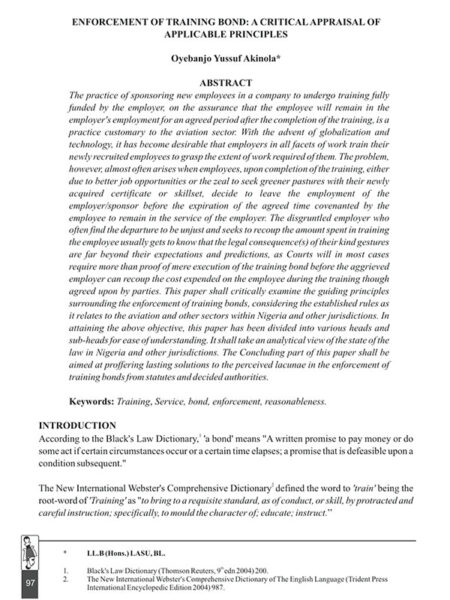
Enforcement of Training Bond: A Critical Appraisal of Applicable Principles
0₦2,500.00Oyebanjo Akinola, in his article, Enforcement of Training Bond: A Critical Appraisal of Applicable Principles, notes that the practice of sponsoring new employees in a company to undergo training fully funded by the employer on the assurance that the employee will remain in the employment of the employer for an agreed period after the completion of the training is a common practice in the workplace. The problem, however, almost often arises when employees, upon completion of the training, either due to better job opportunities or the zeal to seek greener pastures with their newly acquired certificate or skillset, decide to leave the employment of the employer/sponsor before the expiration of the agreed time. The disgruntled employer who often find the departure to be unjust and seeks to recoup the amount spent in training the employee usually gets to know that the legal consequences of their kind gestures are far beyond their expectations and predictions, as Courts will, in most cases require more than proof of mere execution of the training bond before the aggrieved employer can recoup the cost expended on the employee. Akinola critically examines the guiding principles surrounding the enforcement of training bonds, considering the established rules as it relates to aviation and other sectors within Nigeria and other jurisdictions.
-
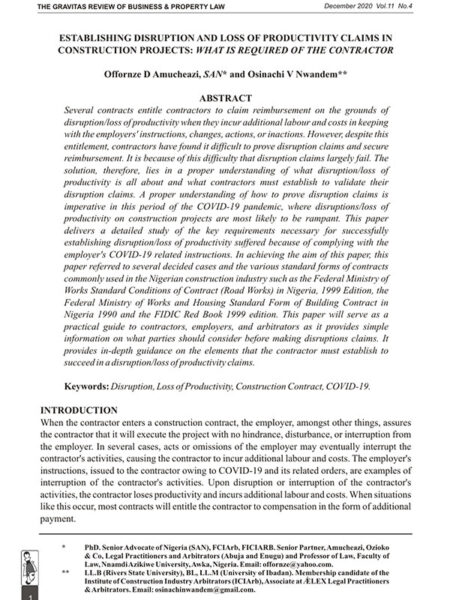
Establishing Disruption and Loss of Productivity Claims in Construction Projects: What is Required of the Contractor
0₦2,500.00Professor Offornze Amucheazi, SAN of the Nnamdi Azikiwe University Awka Nigeria and Osinachi Nwandem, Associate at ǼLEX in their article, Establishing Disruption and Loss of Productivity Claims in Construction Projects: What is Required of the Contractor, note that while contracts may entitle contractors to claim reimbursement on the grounds of disruption/loss of productivity when they incur additional costs, contractors have always found it challenging to prove disruption claims and secure reimbursement. The solution lies in a proper understanding of what disruption/loss of productivity is and what contractors must establish to validate their disruption claims. Professor Amucheazi and Nwandem analyse how to prove disruption claims against the background of COVID-19 pandemic. They review several decided cases and the various standard forms of contracts commonly used in the Nigerian construction industry including the FIDIC Red Book, the Federal Ministry of Works Standard Conditions of Contract (Road Works) in Nigeria, and the Federal Ministry of Works and Housing Standard Form of Building Contract in Nigeria, to come up with a practical guide to contractors, employers, and arbitrators.
-
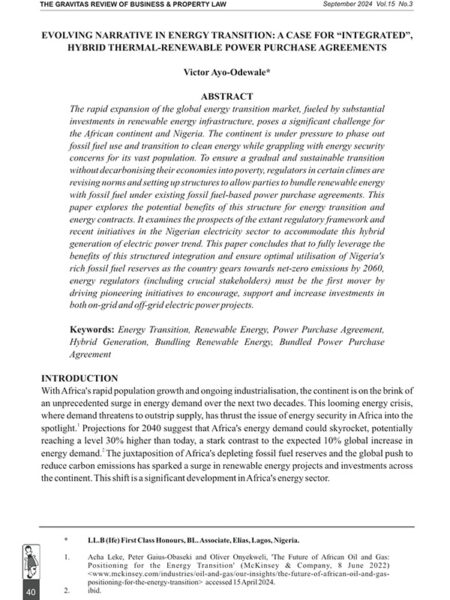
Evolving Narrative in Energy Transition – A Case for “Integrated”, Hybrid Thermal-Renewable Power Purchase Agreements
0₦2,500.00Victor Ayo-Odewale in his article, Evolving Narrative in Energy Transition – A Case for Integrated, Hybrid Thermal-Renewable Power Purchase Agreements, explores the implications of this structure for energy transition and energy contracts. Ayo-Odewale examines the prospects of the extant regulatory framework and recent initiatives in the Nigerian electricity sector to accommodate this hybrid generation of electric power trend. The rapid expansion of the global energy transition market backed by massive investment in renewable energy infrastructure presents a significant challenge for the African continent and, indeed, Nigeria. The continent is under pressure to phase out fossil fuel use and transition to clean energy while it continues to grapple with energy security concerns for its vast population. To ensure a gradual and sustainable transition without decarbonizing their economies into poverty, regulators in certain climes are revising norms and setting up structures to allow parties to bundle renewable energy with fossil fuel under existing fossil fuel-based power purchase agreements. Ayo-Odewale concludes that to fully leverage the benefits of this structured integration and ensure optimal utilization of Nigeria’s rich fossil fuel reserves as the country gears towards net-zero emissions by 2060, energy regulators (including key stakeholders) must be the first mover by driving pioneering initiatives to encourage, support and increase investments in both on-grid and off-grid electric power projects.
The Gravitas Review of Business & Property Law



